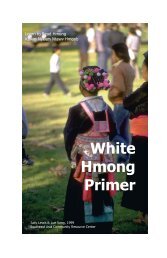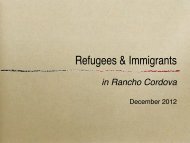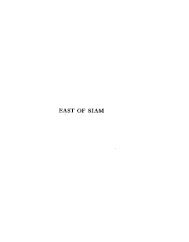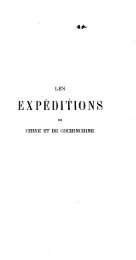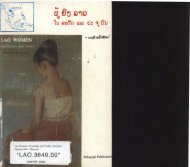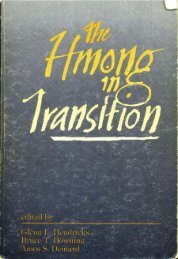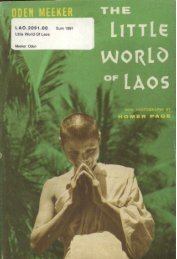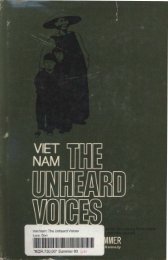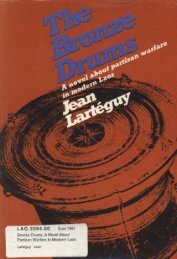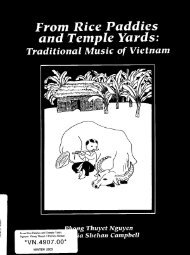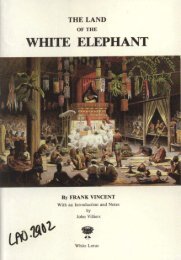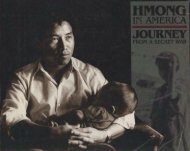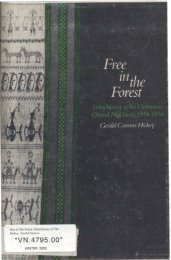PEOPLE
Grant, The Boat People - Refugee Educators' Network
Grant, The Boat People - Refugee Educators' Network
- No tags were found...
Create successful ePaper yourself
Turn your PDF publications into a flip-book with our unique Google optimized e-Paper software.
Th Bad! AopZ6<br />
mckcd our m~ night to a new economic zone in Kicn Gisng province. I was<br />
unnble to find out exactly where hry were. When my father arranged for<br />
us to go inm hiding he said we should make every endeavour m lcaw Vicmam 7<br />
and thmt is why we escaped by boat on 24 March 1979.<br />
'<br />
Ong Tin Loe was a 17-year-old Chincse high-school student in<br />
Cholon. His parents were general merchants. After the communist '.,<br />
mkeover in 1975, they stwkpilcd impolred gods, prices of which<br />
were shooting up, so that they could sell gradually at a gmd profit.<br />
The shop was seized with its contents in March 1978. His father<br />
avoided an NEZ by becoming m approved state worker in a cooperative<br />
making wheat noodles. However, in September 1978, Lac<br />
was instructed to register for military service. Besides poor living I,,<br />
conditions, suweillance ('whatever you did people watched you') :i.<br />
and r desire to study medicine, which he did not think he could do<br />
as a Chinese in Vietnam, Lm said he left for Malaysia because he ,!:,<br />
was determined to avoid the draft. 'We Chincse don't want to fight ii.<br />
Chin=. We also hate the communists and don't want to fight for r<br />
the mmmunists.' Bur wasn't Chins communist? 'Well, they ur 4,<br />
closcr to us, When war broke my family felt a little bit of sympathy ' :<br />
for China. After all my grandmother is in China. Grandfather used ,;I;.<br />
to say to us: *China is our home. Vietnam is only our second home"! '/<br />
Tran Xuong, fifty-six, was a wealthy Chinese rice trader with a<br />
mill near Soc Tnng in the Mekong delta province of Hau Giang.<br />
He had seven1 dozen hectares of good farming land that belonged '<br />
to his wife, and houses in both Soe Trang and the Saigon area. His<br />
iron-grey hair is mopped short and he has a gold tooth that gleams<br />
,<br />
when he smiles, Ncither he nor his family of four boys and six girls<br />
were under pressure to go to an NEZ because they had established<br />
themselves as farmen on one of the family plots of land. Beforc he c'.<br />
left Vietnam he took steps to safeguard his property by puning in s<br />
relatives. He was furious about the loss of his rice mill shortly after<br />
the communist takeover in 1975,<br />
We grew rice on a m+hccmrc plot, iust enough for ou~lves. Wha's thc<br />
use of growing more if hey take it from you? They say they an going to<br />
give you w much in cash bur they never do. They speak very nicely but jus<br />
give you bits of paper. For my mill they gave me an IOU ~aying the money<br />
could be cotltcted from the local communist parry ofice, If I'd aid, I'd have<br />
.;I<br />
1<br />
been m#d. The drr acvenl k -bed me as a 'capimlist' or an<br />
'exploitiw eppitalisf. I couldat he in Vkmam any Ionwrger. We had M<br />
future, I WPS fed up with wor)elap in h &Ids and then having to go in the<br />
evehip to liwn to what the wrnmwha had to say in political mcctinp!<br />
LC Chi Bang, a 28-year-old repairman from Cholon, set sail for<br />
Ausmlh on 26 March 1979, He left with his two brothers and thm<br />
sisters bemuse the savings his parents had given him in March 1978<br />
were mning out. They had handed over fifty taels of gold (worth<br />
about $15 000) before leaving Vietnam with his younger sister, 'In<br />
a year we had spent ten taels on food and living, I also had to bribe<br />
cadres who came to our house eveiy month so that my brother and<br />
I wwldnt have to do military service!<br />
Being officially regarded as unemployed inmased the risk of<br />
being sent to m NEZ. Diminished opportunities for teniaiy education,<br />
k u r thw of less privileged backgrounds got precedence,<br />
meant many sons and daughters of the rich or middle class joined<br />
the unemployed, Thm on declining incomes and without oflicially<br />
approvtd occupations, if they resisted pressure to mnsfer them from<br />
the overcrowded cities to the countryside, were lkblt to have their<br />
ration cards withdrawn. This inmastd their reliance on the black<br />
market, where costs of fwd and other basic necessities were many<br />
times higher than the government price, so that their savings<br />
dwindled even fa#er,<br />
One of the early arrivals at the Le Minh Xuan NHZ outside Saigon,<br />
where 200 families lived, was s Vianamest Catholic family of<br />
eleven who moved there from Ho Chi Minh City under pressure<br />
in August 1976. Nguyen Manh Hung, twenty-four, said a bus was<br />
supplied to take them there, together with some furniture and<br />
clothing. They were given a thousand square metres of land for their<br />
own use, some farm implements, and corrugated iron sheeting for<br />
a house. The land had not ken clewed and the soil was poor. They<br />
eied to grow rice, then turned to pineapples. Supposed to be completely<br />
self-sufhicnt, they were given no fd, even to start with.<br />
However, families poorer than his, who could nor afford to buy rice<br />
on the black market, were given f d by the government. Young<br />
people could do various jobs in the NEZ, being paid a maximum of<br />
nine kilograms of rice a month. After some time the family decided<br />
to quit. Leaving their parents, who had rubercuIosis and could get<br />
1011




